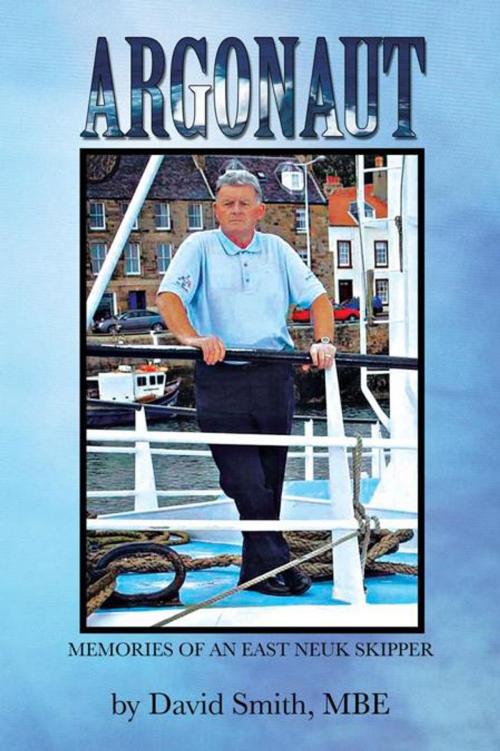| Author: | David Smith | ISBN: | 9781477249857 |
| Publisher: | AuthorHouse UK | Publication: | December 11, 2012 |
| Imprint: | AuthorHouse UK | Language: | English |
| Author: | David Smith |
| ISBN: | 9781477249857 |
| Publisher: | AuthorHouse UK |
| Publication: | December 11, 2012 |
| Imprint: | AuthorHouse UK |
| Language: | English |
David Smith was born in 1930 into a dynasty of fishermen. He found himself a young teenager at the end of World War II. From the most humble expectations of life, he set to work rising from his first job as a boy cook on a herring drifter to ownership of a string of the most successful inshore fishing vessels of his era. As a young skipper, David began to notch up unsurpassed catch records. He was gifted with a personal determination to be successful and in a series of his boats, all named Argonaut, David repeatedly claimed trophies for skippering the crew of the inshore vessel topping the annual grossings table throughout Scotland. His success dominated an era. David was to become something of a pioneer in the British fishing industry. He kept himself abreast of all new developments through international fishing publications. He was to make a significant contribution through the input of his own practical ideas, which helped to shape the design and development of engineered laborsaving powered equipment. His single-minded approach would lead him to seize the initiative, to show willingness to undergo testing and the courage to make changes to long-held practice. The skipper bears a heavy responsibility for his crew, and David Smith served the fishing community through assisting in the development of changes that were to make a significant difference to Scottish fishermens working lives, their conditions, and their safety. As a skipper, David led by example. His readiness to experiment in adapting, testing, and redesigning equipment in the fishing industry saw him introducing the first shelter deck to the Scottish fleet for the protection of his crew. This innovation was subsequently widely adopted, and eventually, full shelter decks became the standard throughout the Scottish fleet. David Smith is a recipient of the MBE for his services to the fishing industry. But ultimately, what emanates from the text are the personal qualities of a man whose life was dedicated to fishing. He is a resourceful and determined man, thoughtful, single-minded, and courageous, at times self-deprecating and yet maintaining his sense of humour. David Smiths personal story as a skipper acknowledges both hardship and success and offers us a rich and valuable primary source that provides insight into a disappeared way of life. It is the record of a tight-knit family at home and at work and the mesh of those family lines within the wider fishing community. Those who pick up and read Davids book will immediately recognize it as a significant contribution not only to local history but to the wider context of the British fishing industry.
David Smith was born in 1930 into a dynasty of fishermen. He found himself a young teenager at the end of World War II. From the most humble expectations of life, he set to work rising from his first job as a boy cook on a herring drifter to ownership of a string of the most successful inshore fishing vessels of his era. As a young skipper, David began to notch up unsurpassed catch records. He was gifted with a personal determination to be successful and in a series of his boats, all named Argonaut, David repeatedly claimed trophies for skippering the crew of the inshore vessel topping the annual grossings table throughout Scotland. His success dominated an era. David was to become something of a pioneer in the British fishing industry. He kept himself abreast of all new developments through international fishing publications. He was to make a significant contribution through the input of his own practical ideas, which helped to shape the design and development of engineered laborsaving powered equipment. His single-minded approach would lead him to seize the initiative, to show willingness to undergo testing and the courage to make changes to long-held practice. The skipper bears a heavy responsibility for his crew, and David Smith served the fishing community through assisting in the development of changes that were to make a significant difference to Scottish fishermens working lives, their conditions, and their safety. As a skipper, David led by example. His readiness to experiment in adapting, testing, and redesigning equipment in the fishing industry saw him introducing the first shelter deck to the Scottish fleet for the protection of his crew. This innovation was subsequently widely adopted, and eventually, full shelter decks became the standard throughout the Scottish fleet. David Smith is a recipient of the MBE for his services to the fishing industry. But ultimately, what emanates from the text are the personal qualities of a man whose life was dedicated to fishing. He is a resourceful and determined man, thoughtful, single-minded, and courageous, at times self-deprecating and yet maintaining his sense of humour. David Smiths personal story as a skipper acknowledges both hardship and success and offers us a rich and valuable primary source that provides insight into a disappeared way of life. It is the record of a tight-knit family at home and at work and the mesh of those family lines within the wider fishing community. Those who pick up and read Davids book will immediately recognize it as a significant contribution not only to local history but to the wider context of the British fishing industry.















